
The Progressive Choice - Chuck Turner
takes a bribe, no doubt just one of many.
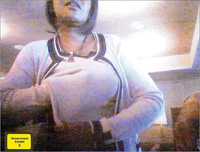
Darling of the Left - Diane Wilkerson
stuffs her bribe money into her bra.
2008 CCJ Notes
[items moved from main page]
Dec 7, 2008 - The Boston Globe's "Quotes of Note" on Sat, Dec 6 included the following item:
"I went to electric razors so I would not have to look at myself in the morning."-- Former New York governor MARIO CUOMO, on why he won't sit to have his portrait done
Cuomo's quote was taken from a recent New York Times article. Say what you will about Mario Cuomo (I always thought he was one of the classiest political figures in the country), but he's consistent. His quote is an echo of something he once wrote in the November 1985 issue of the National Lampoon - the "Mad As Hell" issue devoted entirely to statements from prominent Americans about what makes them angry. Mario Cuomo's contribution was this:
Mirrors
I am mad at mirrors. They are multiplying obscenely, confronting me at every turn...with myself.
At my age, mirrors serve only as a reproach. They magnify the retreat of my hairline, the breadth of my nose, the size of the bags under my eyes.
I don't need them reflecting my every wrinkle in lobbies, elevators, and restaurants, or creating the illusion in cramped rest rooms that I am sharing space with a stranger.
Such ubiquitousness compels the kind of self-scrutiny once reserved only for my soul.
That is bad for my image.
[Mario Cuomo's statement was accompanied by a photo of him sitting at his desk with his reflection clearly visible in the glass desktop.]
By the way, the gallery of National Lampoon covers can be found at http://lampoon.rwinters.com. Yeah, those are mine. - RW
Nov 21, 2008 - The Trash Collection Continues - Boston City Councilor Chuck Turner arrested
 The Progressive Choice - Chuck Turner takes a bribe, no doubt just one of many. |
 Darling of the Left - Diane Wilkerson stuffs her bribe money into her bra. |
State Senator Diane Wilkerson arrested on corruption charges
[and don't forget, ladies, that the best place to stuff your bribe money is in your bra, not in your pockets - but don't forget to have all of your acquaintances frisked for cameras first!
Preserving the Majesty of Old Works (by Robert Campbell, Boston Globe, Nov 16, 2008)
|
Nov 10, 2008 - Announcement from the Cambridge School Committee and Superintendent Thomas Fowler-Finn: Per his public announcement in September, Superintendent Thomas Fowler Finn will be retiring as superintendent of the Cambridge Public Schools on February 4, 2009. The Superintendent thanks the School Committee for accommodating his schedule and the School Committee thanks the superintendent for agreeing to be available if needed during his leave beginning November 14, 2008 extending through the February 4, 2009 retirement date. Both parties are pleased to announce that Deputy Superintendent Carolyn Turk will serve as acting superintendent until Feb. 4, 2009. The School Committee would like to thank Dr. Fowler Finn for his five years of service to the district. He and his talented staff had many accomplishments, including increasing the graduation rate at CRLS and implementing the block scheduling model, creating a public Montessori school, increasing enrollment, developing a new teacher evaluation system and creating the Cambridge Leadership Network. The School Committee has begun the search for a new superintendent of schools and will soon be announcing a process that will include meetings with stakeholders including parents, staff, administrators, as well as business and community leaders. A Message from the Superintendent of Schools: Dear Cambridge Public Schools community members, This early exit allows for a smoother transition for all parties involved the School Committee can begin work with the capable Dr. Carolyn Turk on the budget and impending matters, and I can get an early start on the next phase of my career while making myself available to Dr. Turk and the School Committee as needed. I have an exciting opportunity to pursue, and the timing of my departure could not be better. I’ve spent nearly 38 years in public education as a teacher, principal, assistant superintendent, and superintendent in numerous locales, including Vermont, New York, and Indiana, and I would be remiss if I didn’t stress to you my firm belief that the Cambridge Public Schools faculty and staff is the most talented and dedicated I have ever worked with. Nowhere else have I seen custodians, cafeteria workers, clerks, technicians, teachers, and administrators who care as much as you do about the students we serve. I have truly enjoyed working here, in a city that values education like no other, and supports its school system in ways not seen anywhere else in this country or perhaps the world, and will always value the many professional relationships and friendships I’ve made during my time here. Finally, I’d like to publicly thank the two people who have helped me the most during my tenure, my two assistants Marylou Wright and Elaine Carrieri. They have done a tremendous job. I wish you all the very best, Thomas Fowler-Finn Comment: The fact that Tom Fowler-Finn was able to put up with these School Committee members for as long as he has should qualify him for some kind of endurance record. God help the next poor bastard who will have to suffer through their pointless BS and "policies" leading around in circles. As someone who has taught mathematics for several decades, I would advise any potential candidate for the CPS top job to just keep looking. -- Robert Winters |
Election Eve 2008 - In case you've just awakened from a very long and beneficial sleep lasting two years (lucky you for being able to avoid listening to pundits, partisans, and putzes), the polls will be open in Cambridge on Tuesday, November 4 from 7:00am to 8:00pm. [Click here to find out where to vote.]
On Mon, Oct 27, 2008 the Cambridge City Council met at 5:30pm in a Roundtable meeting to discuss "ongoing strategic planning activities at the Cambridge Health Alliance." Meanwhile, the Boston Globe reports: Healthcare network says it may lay off hundreds due to deep cuts in state funding.
Eloquence - This speaks for itself. Or at least attempts to.....
Boston Celebrates Opening of Aqueduct: October 25, 1848
ON THIS DAY...
...in 1848, 300,000 people from all over New England gathered on Boston Common. They came to celebrate the completion of the city's first municipal water system. With the construction of an aqueduct that brought fresh water 15 miles from Lake Cochituate in Natick to Boston, the city for the first time had a pure supply of water for drinking, bathing, cooking, and cleaning. As the sun set, the gates to the fountain in Frog Pond were opened and a stream of clean water shot 80 feet in the air. People cheered and wept with joy. The celebration continued the next day, when the mayor announced that schools would close so that the city's children could play in the Frog Pond fountain.
Read more about this moment: http://www.massmoments.org/moment.cfm?mid=308
Oct 7 - Why We Should Let Housing Prices Keep Falling - Edward L. Glaeser (in the NY Times)
Sept 23 - Residents of Cambridge, home of proportional representation elections (using the Cincinnati method of surplus ballot distribution), may be interested to know that there's a ballot question this November 4 in Cincinnati that reads as follows:
PROPOSED CHARTER AMENDMENT
CITY OF CINCINNATI
A majority affirmative vote is necessary for passage.
Shall the proposed amendment to the Charter of the City of Cincinnati to provide for a method of proportional representation for electing the members of Council whereby each voter ranks candidate choice in descending order from 1 through 9 on each ballot; to provide for the counting of ballots and the determination of results whereby the ballots that are not needed or cannot be used to elect a candidate are distributed to the next highest candidate choice on each ballot who remains eligible to be elected; to provide for the ballot language and direction to voters; to provide for the election of two candidates for mayor in a primary election who shall be eligible for the regular municipal election for mayor; to provide for the election of mayor in the general election; to provide for the choice of write-in candidates; to provide for the election of council and the mayor by ballot without designation of political party; to provide for the marking, sorting and counting of ballots and tabulating the results in a manner consistent with the charter and general election law for non-partisan ballots; to provide for the ongoing validity of Article IX should any provision of Article IX be amended or held unconstitutional or in violation of state law; to provide for the use of mechanical, electronic or other devices for vote counting; and provide other procedures to implement proportional representation by repealing existing Sections 5, 5a, 7, 8, 11 and 12 and enacting new Sections 5, 5a, 7, 8, 11, 12 and 13, be approved?
YES
NO
You don't have to be a Cambridge political junkie to recognize the content of "Issue 8" on the Cincinnati ballot. This would restore the nonpartisan proportional representation elections used in Cincinnati until its repeal in 1957 (except for the minor change of limiting the number of ranked choices to 9). [Read the history.] It also (apparently) provides for the reduction to two mayoral candidates in a primary election using the same method. [Whether the "Cincinnati method" of surplus ballot distribution or a superior "fractional distribution" is used is unclear from the text.] More information is available at the website of Better Ballot Cincinnati at www.betterballotcincinnati.com. - Robert Winters
Post-election postscript - The Cincinnati ballot question failed 45-55%.
On this date (July 3): From the Cambridge Historical Commission website: Q: Did George Washington take command of the American Army under the Washington Elm? A: This popular legend became part of American popular culture as early as the 1830s. The story was made famous during the centennial year of 1876, with the publication of a fictitious "eye-witness" journal, The Diary of Dorothy Dudley. The tree itself was indeed real and stood in the middle of Garden Street at the intersection of Mason Street. In 1923, the diseased and very fragile trunk was accidentally pulled over by a city worker. A plaque embedded in the street's pavement marks the original location of the tree. Washington did take command of the army in Cambridge on July 3, 1775, but there is no documentation to indicate that the event took place under the elm tree. Washington established his New England headquarters at the Vassal House on Brattle Street (now better known as the Longfellow House), where he resided until April 1776. The myth of Washington and the elm is still widely known today, and the image of the tree remains a symbol of patriotism in Cambridge. |
One object of desire among Cambridge historians is a piece of the original Washington Elm tree.  Mine is a carved circular box made from one of its branches. |
Aug 21, 2008 - State to take over building of North Point T station (Boston Globe)
Aug 8, 2008 - George McGovern: My Party Should Respect Secret Union Ballots (Wall Street Journal)
Meanwhile "The One" says otherwise.
Aug 6, 2008 - Middlesex County Register of Probate John Buonomo is a Thief- Boston.com [Aug 7 full article]
Aug 7 Boston Globe article on Buonomo's arraignment
PS - to all of my Cambridge friends who said what a great guy Buonomo is.... spare me your opinions in the future.
PPS - District Attorney Gerard Leone continues to impress me. He's a cut above all of his predecessors and we're lucky to have him.
Aug 6, 2008 - A Tyranny of True Believers - by Robert Samuelson
Aug 6, 2008 - My choice for president (well, at least my choice for today)
|
July 9, 2008 - Be careful what you wish for... Today's Boston Globe features a column by Scot Lehigh on the upcoming Mass. House vote on the "National Popular Vote" bill, a legal workaround that would effectively allow the presidential candidate with the highest nationwide popular vote to be elected. (Read the column for the details.) It's an interesting idea and has a lot of merit. However, there are also a few unanswered questions about it and some possible unintended consequences. For starters, the situation now is that candidates invest the lion's share of their resources into the swing states. That's why Massachusetts voters see far fewer campaign ads than do people in places like Florida, Michigan, and Ohio. In fact, the target audience for a Massachusetts ad may well be a New Hampshire voter. If the National Popular Vote bill passes in enough states, one consequence will be that the Red State/Blue State dichotomy will become somewhat obsolete. Candidates will be able to mine votes from wherever they hope to get them because the game will be racking up total votes rather than winning individual states. It is likely that this would turn presidential elections into a 50-state campaign. That's a good thing, right? Well, maybe yes and maybe no. While it's hard to argue with the logic of "whoever gets the most votes should win," we should also think about what this may mean in terms of campaign finance and the influence of money in (presidential) politics. It will cost a lot more money to run a 50-state campaign and pay for nationally broadcast TV spots. These don't come for free. We should expect that influential donors will become even more influential, and that may not be such a good thing. Another consequence may be that "retail politics" will fade into history in favor of "broadcast politics." That is, shaking hands, eating diner food, and chatting with individual voters in swing states will no longer have as much effect as good old broadcast propaganda. It will be American Idol every four years - one big popular TV Show. Some unanswered questions (at least to me) are: What would happen should the country ever develop a viable third party? What happens if no candidate wins a majority of the popular vote? Would the plurality winner be elected even if he or she received less than 40% of the national popular vote? What happens if the national popular vote is VERY close? Will there be a call for a nationwide recount? - There are plenty of other questions that can be asked, so I hope legislatures across the country go very slow on this proposal. - Robert Winters |
Picture Postcards
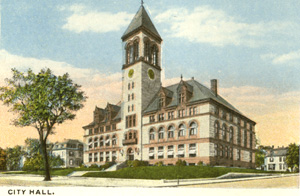 |
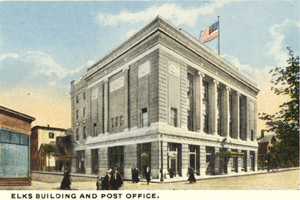 |
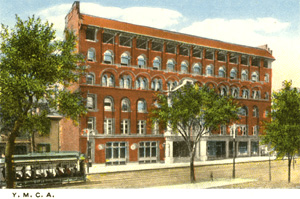 |
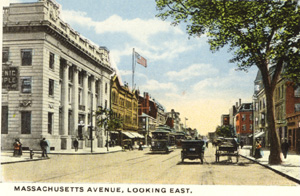 |
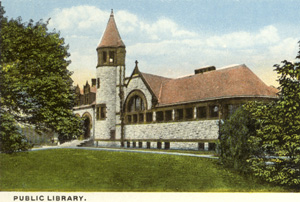 |
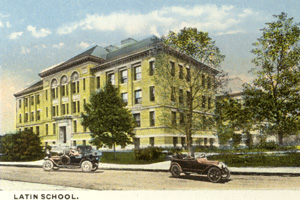 |
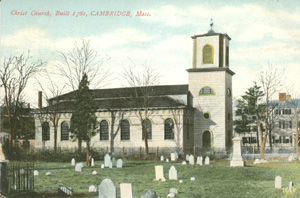 |
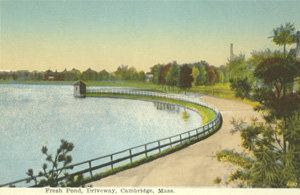 |
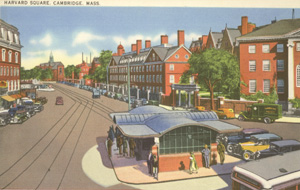 |
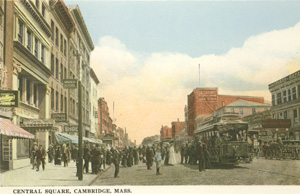 |
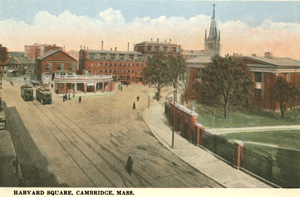 |
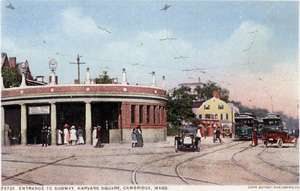 |
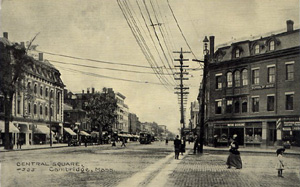 |
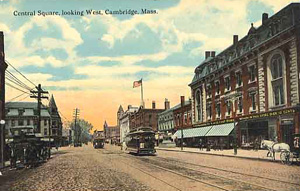 |
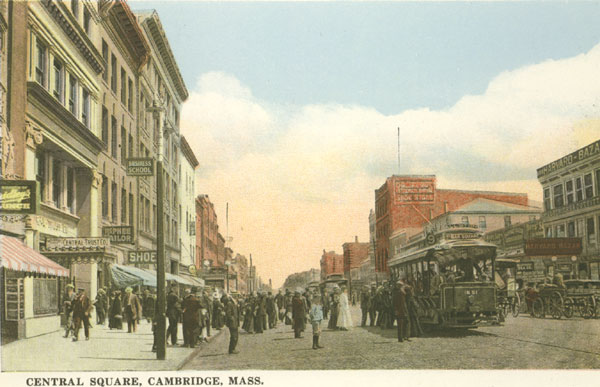 |
|
| June 11, 2008 | |
|
The official grand opening of the new Greene Rose Park near Broadway and Windsor Streets takes place today (Wed, June 11) at 3:00pm. This is a great-looking park. It was filled with kids playing in the field and the fountain several days before the official opening. In two weeks (Wed, June 25 at 4:00pm) there will be another grand opening of the new park/plaza in Lafayette Square across the street from the Fire Station.
|
|
|
|
|
July 31, 2008 - A cone of silence for ice cream trucks (Boston Globe)
Boston City Council votes Yes to Obnoxious Boom Cars! and No to Ice Cream Trucks!
Perhaps the best evidence yet that the Boston City Council is comprised of brain-dead panderers, on July 30 they passed a new city ordinance that will prohibit ice cream vendors from playing their familiar jingles while stationary. (They can still play the jingle while the trucks are moving.) Apparently, some of their constituents complained about the incessant jingles. Meanwhile, cars with ear-splitting sound systems cranking out high-decibel "music" can still drive down any Boston street, stop at traffic lights and stop signs, or park while puking out their auditory vomit. However, if they turn off the cop-killin' gangsta rap and play an ice cream jingle, they'll be violating the law.
July 28, 2008 - Report urges Cambridge not to enact nanoparticle regulations (by Robert Weisman, Boston Globe)
July 26, 2008 - Unintended fallout of loan crisis (by Richard L. Cravatts, Boston Globe Op-Ed)
Jo Stafford (Nov 12, 1917 - July 16, 2008) - "You Belong to Me"
You may also want to listen to "I'll Be Seeing You"
July 17, 2008 - Seattle’s Automated Toilets Go Way of the Box and Chain (New York Times)
This one's worth mentioning only because some Cambridge city councillors were pressing the City Manager to install these fixtures in the public squares of Cambridge, and the Manager (correctly) resisted. It would make a lot more sense to offer a small subsidy to local businesses to cover the expenses associated with allowing public access to their facilities.
July 14, 2008 - Government as the Big Lender - New York Times news analysis
July 14, 2008 - A popularity contest that can't succeed - David Lewis Schaefer op-ed on "National Popular Vote" in Boston Globe
July 13, 2008 - Cambridge housing sales take hardest hit in area (Boston Globe)
|
July 7, 2008 - Lawrence Frisoli, former Cambridge City Councillor, passed away on July 2 at the age of 57. He was a City Council candidate in 1975 (as was Lenny Clarke) but was not elected. In 1977, he finished 4th in #1 votes and was the 7th elected in the PR Count. He served one term during which he was chosen as vice-chair by his City Council colleagues. He ran for a 3rd time in 1979 but finished 13th in #1 votes and was not reelected. Boston Globe obituary: Lawrence Walter Frisoli, of Cambridge & Belmont, passed away July 2, 2008. Husband of MaryJo (O'Connor). Father of twin sons Michael & Morgan. Son of the late Frank and Mary (DeGuglielmo) Frisoli. Brother of Mary Ann (Jim) Harold, Elizabeth (Andrew) Breuder, Frank (Janice) Frisoli, Angela (Matthew) Tomlinson. Nephew of his beloved aunt Joan DeGuglielmo, Frances Tingle & Alice DeGuglielmo. Survived by nieces & nephews. Funeral from the Donovan-Aufiero Funeral Home, 140 Otis St. (at 6th St.) EAST CAMBRIDGE Wednesday at 8 AM followed by a Rite of Christian Burial in St. Francis of Assisi Church, 325 Cambridge St., Cambridge at 9 AM. Visiting Tuesday 2-5 & 6-9 PM. Interment Cambridge Cemetery. Larry was an attorney at Frisoli & Frisoli in Cambridge, participated in Mass Adult Soccer Association, Cambridge City soccer team & was a former Vice-Mayor of Cambridge. In lieu of flowers send donations to the BC High Lawrence W. Frisoli Scholarship Fund, 150 Morrissey Blvd., Boston 02125. For guestbook, please visit: www.donovanaufierofuneralhome.com. July 8 Boston Globe expanded obituary for Lawrence Frisoli July 9 Cambridge Chronicle obituary |
|
Comment on Cambridge Chronicle editorial In today's (June 19, 2008) Cambridge Chronicle, the following editorial appeared: Cambridge - There are two behemoths living in Cambridge right now: they add character, knowledge, civic pride and, most importantly, jobs. We’re talking about Harvard and MIT, two universities with plenty of money and plenty of influence in this town. Harvard’s endowment is worth an estimated $35 billion; MIT’s $10 billion. That’s a heck of a lot of money for any institution. It seems like a lot more money in the midst of this troubling recession and at a time when universities throughout Cambridge and Boston are expanding in an unprecedented manner. But the kicker is they don’t pay any property taxes. (emphasis added) Last month, the House voted to study a 2.5 percent tax on university endowments that exceed $1 billion. A tax would benefit the community as a whole, putting sorely needed funds into public education, police, health programs and other social services. Already, we’re seeing that some legislators are weighing in on the issue. State Rep. Will Brownsberger said he’s opposed to the tax. On the other side of the coin, state Rep. Tim Toomey, also a city councilor, said he would support it. “The percentage of the taxed endowment should fairly reflect the shared financial burden of providing city resources to a large university and its student population,” said a Toomey aide in an e-mail to the Chronicle. Other legislators said they would be “interested” in studying the idea of a tax or said they would withhold judgment until a study is complete. But with tough economic times ahead, the idea of a tax seems more sensible than ever. I tried to post a comment on the Chronicle's website, but either their software is broken or they're holding my comment for review. In the meantime, here's what I had to say: Your editorial stated: "But the kicker is they don’t pay any property taxes." While we may hold various points of view regarding how much tax the universities should pay to the City of Cambridge, the statement that the universities pay no property taxes is false. For example, according to the City's FY2007 Annual Town-Gown Report: Harvard paid $4,605,164 in property taxes plus a payment of $2,105,490 in lieu of taxes. Combined with other fees, their total payments were $15,173,863. MIT paid $25,322,904 in property taxes plus a payment of $1,922,079 in lieu of taxes. Combined with other fees, their total payments were $34,405,734. In fact, according to the FY2009 Budget book, MIT is the #1 taxpayer in the City of Cambridge. Their FY2008 property tax payment was $25,399,853 which represents 10.48% of the total tax levy for the City. Again, we can discuss whether there should be some additional taxation on university endowments or whether they are paying their fair share, but PLEASE don't continue the misinformation that the universities don't pay ANY property taxes. - Robert Winters |
June 5, 2008 - Foreclosure Rates in Massachusetts Cities and Towns: 1990–2007 [URL expired]
This is a great graphic representation of how foreclosure rates have varied over the last two decades and why, perhaps, there may be far less reason for concern that some might have you believe.
Note on the June 5, 2008, 6:00pm Public Hearing on Community Preservation Act Fund Allocation and Expenditures [The Community Preservation Act Committee will hold a public hearing that will include public suggestions for CPA fund allocations and project grant expenditures for Housing, Open Space and Historic Preservation.]
Remark: Since its inception after being voted in the 2001 election, meetings of the CPA Committee have never seriously considered any adjustment to the allocation of 80% of funds toward affordable housing, 10% toward Open Space Acquisition, and 10% for Historic Preservation. The only matters on the table have been which projects to fund within each category, and most of those decisions have been made administratively before any committee meetings. In recent years, advocates for open space acquisition have begun to show a greater presence at these largely pro-forma meetings, but Cambridge's public/private affordable housing industry leaders have always gone out of their way to pack the meetings with housing advocates. I hasten to add that I'm not personally advocating for what the appropriate allocations should be - only that there is little, if any, real public process on these budgetary decisions and all public meetings I've witnessed to date have been little more than “show and tell” by the Affordable Housing Trust, Just-A-Start, and related agencies.
June 4, 2008 - For your enjoyment: http://www.flixxy.com/story-of-a-sign-short-film.htm
May 15, 2008 - Alice in Housing Land (George Will, Real Clear Politics and the Washington Post)
Apr 25, 2008 - Study Suggests Math Teachers Scrap Balls and Slices (Kenneth Chang, New York Times)
| April 20, 2008 - Seriously, what does this official City web page for the Office of the Mayor tell us about the operation of that office? The current mayor was chosen by her colleagues on January 14 - over three months ago. Most of the links on that page send you back to the main City web page. [April 28 Addendum - The site has finally been updated.] | Apr 10, 2007 The Mayor’s Web Page is under construction pending appointment of a new Mayor for the City of Cambridge. |
Apr 18, 2008 - Minding the Achievement Gap (by Vidya Viswanathan, Harvard Crimson)
Cambridge Public Schools focus on improving performance despite achievement discrepancy
Apr 17, 2008 - State Senator Anthony Galluccio moves to make affordable housing less affordable (Boston Globe article)
Our newest state senator has filed an amendment to the latest housing bond bill that will require developers to pay a “prevailing wage” to workers on projects of at least 75 units or at least $25 million in total development costs. As the article reports: “A 2007 study by the Massachusetts Housing Partnership of multifamily developments between 2002 and 2006 found projects that paid prevailing wages spent 34 percent more on each unit, or about $60,000 per unit.”
Apr 4, 2008 - The Boston Globe yesterday reported that the current per pupil cost for the Cambridge Public Schools is $15,175 (compared to Waltham at $12,900; Somerville at $11,593; Watertown at $11,290; Boston at $10,872; Brookline at $10,546; Newton at $9,135; Lexington at $8,988; Belmont at $8,243; and Arlington at $8,225). However, in the 2007 municipal election campaign, several candidates said it was $23,000 per pupil. The greatschools website give the obviously wrong figure of $8,641. I found a 2003 chart from Alan Price on the cambridgepublic.us website that gives a range between $5,500 and $11,000 for various elementary schools. Metroprofiles.com puts the Cambridge figure at $17,551 in 2005. The Harvard Crimson in 2005 put the figure at about $15,000. For FY2004, the Crimson put the cost per pupil for regular education at $13,363. The Area 4 Newsletter said in 2002 that the projected cost per pupil was estimated to rise from $17,221 in 2002 to $21,419 in 2006. Councillors Toomey and Sullivan and City Manager Healy put the figure at $16,000 in 2000.
So, what's the accurate figure right now? Let me know. I'm sure others would also like to know. - Robert Winters
Apr 2, 2008 - How Not to Save Housing - by Robert Samuelson (at Real Clear Politics)
|
The Board & Commission Project The City of Cambridge has a long list of appointed boards, commissions, authorities, and advisory committees on which hundreds of Cambridge residents (and City employees) serve. In almost all cases, the "appointing authority" is the City Manager. Not long ago there was a City Council Order requesting a list of members who serve on all of these boards, but a complete response was not forthcoming. There was a 1997 "City of Cambridge Boards and Commissions Manual" published by the City Manager's Office that listed most of the existing boards with brief descriptions of each, but this manual is now out of date and, to the best of my knowledge, unavailable. That's where YOU come in. I have set up a web page for all of the City boards and commissions, but it's very much a work in progress. Many who are reading this serve on one or more of these boards and are in an ideal position to provide a list of members and their terms as well as concise descriptions of the purpose of some of these committees. Other attend some of the meetings of these committees are in a good position to provide information. So, here's your invitation. The page is located at http://rwinters.com/docs/boards.htm. My request is that you look over this page and send me suggestions on how best to organize it, provide statements of purpose and other relevant information about each committee, and to give the names and terms of the members of these committees. Some of this information can be taken from various web pages of the City of Cambridge. Other information will come from your personal knowledge from either serving on these committees or attending their meetings. Contact information for board members will not be provided unless members specifically request to have it included. Citizen members of these committees serve out out of a sense of civic duty and should be respected for their willingness to give of their time, their energy, and their intellect. It is rarely, if ever, appropriate for members of the public to contact members of these boards outside of the context of public meetings of the respective boards. |
Mar 19, 2008 - Massachusetts state budget reaches “point of reckoning” - MassInc
Mar 19, 2008 - Who's Zoomin' Who? (Harvard Crimson story "School Super Urged to Stay")
The Cambridge School Committee, really three members and a mayor, appear to be crafting their own new brand of dishonesty. In January, the School Committee voted 4-3 to extend the contract of Superintendent of Schools Thomas Fowler-Finn, though they did not at that time specify a term for the contract extension. The devil may be in the lack of details. In the initial vote on contract extension, members Fred Fantini, Joe Grassi, Nancy Tauber, and newly elected mayor Denise Simmons voted for the contract extension. The opposing votes were Marc McGovern, Patricia Nolan, and Luc Schuster. Some (and this includes me) felt that Simmons' vote was tied to her getting the votes of her Council colleagues to become mayor. It's not unusual that the mayoral selection hinges on some understanding about how the selected mayor will act in his or her role as Chair of the School Committee.
There was some cause for concern at the time of the January contract vote that no term was specified. Cynics (and this includes me) worried that Simmons' deciding vote might have been just the formal conclusion of a deal with her City Council colleagues and that what followed might be a negotiation in which the proposed terms might be so minimal or unacceptable that it would amount to a de facto rejection. The fact that there has been no resolution after two months in what is absolutely a cut-and-dried question is an indication that this School Committee may not have any understanding of what constitutes an understanding. Simmons statement that “you don’t want to rush something that’s so important” is bewildering at best.
Though I have personally only gone to a couple of School Committee meetings this year, I have watched portions of several other meetings on TV. My impression is that this is one of the most dysfunctional groups to have ever occupied the seats in the Henrietta S. Attles Meeting Room. With two petulant children serving on the School Committee, I suppose this was to be expected. What we could use is some leadership from the mayor, but for that we may just have to wait and see. -- Robert Winters
Feb 26, 2008 - Cash is King in Council Elections (by Sarah Howland, Harvard Crimson)
Feb 26, 2008 - Sometimes The Right is right: Decommissioning the peaceniks (Cambridge Chronicle, link expired)
Feb 19, 2008 - I just picked up the results of the Democratic City Committee ward committee elections, including the write-in votes. Here they are: http://rwinters.com/docs/demwards2008.pdf
One interesting thing about these results - they're not correct. Not that it matters much to me or anyone else, but I received enough write-in votes to be among those elected to the Ward 6 Democratic City Committee and the results show this. However, in my own precinct 6-1, as well as in the neighboring precinct 6-2, the results show no write-in votes at all. Only precinct 6-3 shows any write-ins, so apparently any write-in choices on my ballot and on the ballots of others in my precinct were not counted, even though I completed my ballot correctly. [I took a photo of my ballot, by the way, so there's no question that my ballot was completed correctly.] By the way, the Election Commission promised that the complete results would be posted Feb 6, but they were not due to complications with provisional ballots. The results were complete on Feb 12 and were to be posted on the website of the Election Commission the next day. They were still not posted as of Tues, Feb 19.
The main reason I visited the Cambridge Election Commission today was to pick up campaign finance reports for the School Committee candidates. The deadline for submitting these reports was January 20. Neither Richard Harding nor Patty Nolan have filed their year-end reports - a full 30 days after the deadline. [Mar 14 update - Ms. Nolan turned in her report on Feb 25, 36 days late. No word yet on Harding and Walser.] Former School Committee member Nancy Walser is also required to file a year-end report and has not yet done so.
Here are some highlights of the reports:
|
Candidate |
year |
expenditures |
Notes |
#1 votes |
$ per vote |
|
Marc McGovern |
2006-7 |
$ 23,637.00 |
|
2277 |
$ 10.38 |
|
Gail Lemily-Wiggins |
2006-7 |
$ 8,931.61 |
|
1024 |
$ 8.72 |
|
Nancy Tauber |
2006-7 |
$ 9,533.09 |
|
1246 |
$ 7.65 |
|
Luc Schuster |
2006-7 |
$ 12,776.76 |
|
1680 |
$ 7.61 |
|
Patty Nolan |
2006-7 |
$ 12,063.75 |
updated Mar 14 |
1672 |
$ 7.22 |
|
Stefan Malner |
2006-7 |
$ 574.41 |
|
133 |
$ 4.32 |
|
Fred Fantini |
2006-7 |
$ 6,114.00 |
|
2017 |
$ 3.03 |
|
Joe Grassi |
2006-7 |
$ 4,770.52 |
|
1629 |
$ 2.93 |
|
Richard Harding |
2006-7 |
$ 3,849.41 |
estimated |
1562 |
$ 2.46 |
Perhaps the most notable thing is the extraordinary amount of money ($23,637) spent by Marc McGovern for 2006-7 to win his seat. This is not the record high, however. That distinction goes to Marc McGovern for 2002-3 at $27,182. It is noteworthy that incumbent Richard Harding spent relatively little on his campaign and was defeated. In contrast, Fred Fantini and Joe Grassi continued their low-cost, high-effect campaigns in the $3/vote range. No one can ever accuse these two of buying an election. Here are the dollar per #1 vote totals for all School Committee candidates in the last three elections (Harding 2006-7 estimated):
|
Candidate |
2002-3 |
2004-5 |
2006-7 |
| Christopher Craig | $ 0.15 |
- |
- |
|
Fred Fantini |
$ 2.92 |
$ 3.34 |
$ 3.03 |
|
Joe Grassi |
$ 2.50 |
$ 2.98 |
$2.93 |
|
Richard Harding |
$ 5.56 |
$ 5.99 |
$2.46 |
|
Gail Lemily-Wiggins |
- |
- |
$8.72 |
| Ben Lummis | $ 5.52 | $ 7.33 |
- |
|
Stefan Malner |
- |
- |
$4.32 |
|
Marc McGovern |
$ 10.01 |
$ 8.36 |
$ 10.38 |
|
Patty Nolan |
- |
$ 5.80 |
$ 7.22 |
| Alan Price | $ 10.33 |
- |
- |
|
Luc Schuster |
- |
$ 6.17 |
$ 7.61 |
|
Nancy Tauber |
- |
- |
$ 7.65 |
| Nancy Walser | $ 6.02 | $ 5.48 |
- |
I promise to provide some interesting information on the campaign finance reports of City Council candidates soon. Here's some preliminary information on the Council candidates, listed alphabetically:
|
Candidate |
year |
receipts |
expenditures |
#1 votes | $ per vote |
Notes |
|
Henrietta Davis |
2006-7 |
$ 65,796 |
$ 60,999 |
1592 | $ 38.32 |
|
| Marjorie Decker |
2006-7 |
$ 52,685 |
$ 50,960 |
1069 | $ 47.67 |
|
| Jonathan Janik |
2006-7 |
$ 5,019 |
$ 3,923 |
261 | $ 15.03 |
|
| Craig Kelley |
2006-7 |
$ 29,811 |
$ 26,295 |
1118 | $ 23.52 |
|
| David Maher |
2006-7 |
$ 35,535 |
$ 31,547 |
1312 | $ 24.04 | |
| Kevin Moore |
2006-7 |
$ 2,460 |
$ 960 |
251 | $ 3.82 | several reports missing |
| Gregg Moree |
2006-7 |
$ 23,000 |
$ 22,390 |
111 | $ 201.71 | $750 to The Alewife for "insurance" |
| Brian Murphy |
2006-7 |
$ 54,327 |
$ 57,141 |
1160 | $ 49.26 |
|
| Kathy Podgers |
2006-7 |
- |
- |
92 |
- |
no records available |
| Kenneth Reeves | 2006-7 | $ 70,120 | $ 63,218 | 1217 | $ 51.95 | again, no record of payments for office space |
| Sam Seidel | 2006-7 | $ 28,392 | $ 28,064 | 1037 | $ 27.06 | |
| Denise Simmons | 2006-7 | $ 32,133 | $ 35,662 | 996 | $ 35.81 | |
| Edward J. Sullivan | 2006-7 | $ 34,560 | $ 28,622 | 831 | $ 34.44 | |
| Tim Toomey | 2006-7 | $ 63,651 | $ 51,085 | 1339 | $ 38.15 | includes only 2007 receipts/expenditures |
| Larry Ward | 2006-7 | $ 10,706 | $ 11,005 | 699 | $ 15.74 |
Needless to say, Gregg Moree must have set some kind of record for least effective campaign. Among those who were elected, Councillors Kelley, Maher, and Seidel appear to have received the most bang for the buck in their campaigns. -- Robert Winters
|
Feb 23, 2008 (updated) - How has voter turnout changed in the Cambridge municipal elections over the last 50 years? Here are the numbers:
Notes: Of the 56973 registered voters in 2001, 43911 were listed as "active", so if you were to use that as a better measure of actual potential voters, you'd have a percentage of 40% rather than the 31% caused by the provisions of the Motor-Voter Law. Of the 55831 registered voters in 2003, 41069 were listed as "active", so if you were to use that as a better measure of actual potential voters, you'd have a percentage of 51% rather than the 38% caused by the provisions of the Motor-Voter Law. Of the 58666 registered voters in 2005, 41271 were listed as "active", so if you were to use that as a better measure of actual potential voters, you'd have a percentage of 39% rather than the 29% caused by the provisions of the Motor-Voter Law. Of the 56339 registered voters in 2007, 39462 were listed as "active", so if you were to use that as a better measure of actual potential voters, you'd have a percentage of 35% rather than the 24% caused by the provisions of the Motor-Voter Law. |
Jan 29, 2008, 11:00pm - The Cambridge School Committee tonight passed on a 4-3 vote a motion to enter into negotiations for a contract extension with Superintendent Thomas Fowler-Finn.
Voting in favor: Fred Fantini, Joe Grassi, Nancy Tauber, Denise Simmons
Voting against: Marc McGovern, Patty Nolan, Luc Schuster
I'm not aware of the length of the extension or of any other conditions. Much of that will presumably be determined during the contract negotiations.
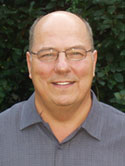
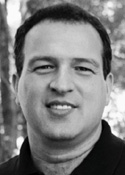
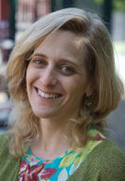
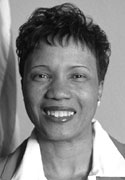
|
January 14, 2008 - It's Mayor Simmons and Vice-Mayor Murphy My fellow occupant in the balcony of the Sullivan Chamber called it as soon as people began arriving for tonight's City Council meeting. The tip-off was the assembled campaign people, family and friends of Denise Simmons over on her side of the Sullivan Chamber. All that remained was to see how the details would play out. Rumors had been swirling since last week about which councillors were going to cross over to cut the deal to make either Denise Simmons, Henrietta Davis, or Brian Murphy mayor. In the end, it was Simmons who was able to garner the five votes and Henrietta Davis and Brian Murphy made it clear as the roll call got underway that the outcome would not be determined this time around by the Billy Walsh coalition. The coalition of the reasonable, including freshman Councillor Sam Seidel, would determine the outcome. In the end, after the outcome was clear, both the vote for mayor and for vice-chair of the City Council was made unanimous as the other councillors changed their votes. This promises to be a good City Council term. Newly elected Mayor Simmons showed us that the Sullivan spirit is still alive and well in the Sullivan Chamber as she swiftly and expertly moved through the City Council agenda and wrapped up the meeting by 7:30pm. We've had to suffer through two years of poorly run meetings that often dragged on toward midnight, but there's hope now that we'll see efficiently run meetings and good City Council subcommittee appointments. The best start would be to give Henrietta Davis any and all appointments she wants since she's been the most consistent in her committee meeting attendance and preparation. There was a comic moment late in the meeting when Councillor Kelley spoke on an Order from Henrietta Davis asking the City Manager to publish Cambridge's snow removal policies “in the Cambridge Chronicle and other local papers” several times this winter. Kenneth Errol Reeves responded that the City should not use the Cambridge Chronicle at all - continuing the kafuffle that raged last year between him and the Chronicle. Councillor Decker then weighed in on the side of Reeves and exercised her charter right to delay the Order until the next Council meeting. For the record, the mayoral vote (the 2nd ballot officially) initially had Davis, Kelley, Murphy, Reeves, Seidel, and Simmons voting for Denise Simmons; Maher and Toomey voting for Tim Toomey; and Decker voting “present” (I won't even bother trying to figure that one out). David Maher then asked to change his vote to Simmons and make the vote unanimous. Decker then changed her vote to Simmons and City Clerk Margaret Drury gaveled the vote closed before Councillor Toomey had a chance to weigh in - declaring the vote unanimous even though no such vote was taken. I suppose you could argue that the vote was actually an 8-1 vote for Simmons since the rules are clear that the vote is final when the gavel drops. Nonetheless, Councillor Toomey did ask to have his vote changed to Denise Simmons after she had already been sworn in. Let's just call it unanimous, regardless of the technicalities. The vote for Vice-Chair of the City Council (traditionally called Vice-Mayor) came next. In the initial vote, all councillors except Decker voted for Brian Murphy. Decker again voted “present”. Only afterwards did she join the others as she changed her vote to Murphy to make the vote unanimous. Some have focused on Denise Simmons' racial and gender identity in regard to her election as mayor. I prefer to think of her as the person who has shown more interest in local Cambridge history than any of the other city councillors. In this regard, she and I are siblings. Cambridge is a city with a history like few others in the United States, and it's great to have someone in the public eye who appreciates this. -- Robert Winters |
|
January 11, 2008 - Thankfully, what appeared to be a move for a quick vote Friday on a contract extension for the School Superintendent (Tom Fowler-Finn) turned out to be an informational meeting only with no votes taken. There will be a public School Committee meeting at CRLS on Wednesday, January 16 at 6:00pm on the topic of the Superintendent's contract, and public comment will be permitted at this meeting. Let's hope the city councillors can put their differences and self-interest aside and settle on a mayor on Monday so that there will be a properly constituted School Committee before this very important matter will be seriously considered.
Make no mistake about it. This is a very important matter and the public has every reason to be concerned. This is one rare occasion where the electorate actually has a stake in the outcome of the mayoral selection, particularly those who have children in the Cambridge public schools. Some of us, including me, are teachers who have strong feelings about maintaining stability in the public schools and who want to keep the current revival on track. I teach mathematics at the college level (Brandeis University and the Harvard Extension School), and my primary concern is that most students graduating from the Cambridge public schools should be fluent in mathematics and able to travel the road toward good opportunities requiring technical skills. I believe we now have, at long last, a Superintendent who has created an environment that can best make this a reality. Almost all of the Cambridge public school teachers I've met agree.
So here's my bottom line on the mayoral issue. If the selection of mayor turns out to make the difference between keeping or not keeping Tom Fowler-Finn for at least a few more years, then I fervently hope the City Council will have the wisdom to choose as their mayor someone favorable to a contract extension for the Superintendent. Based on what I've been hearing, the swing vote could be our newest city councillor, Sam Seidel. Nobody ever said this was going to be a job without controversy and difficult choices. Let's also hope that Sam has the wisdom to not get snookered by those whose real agenda is their own self-interest. -- Robert Winters
January 9, 2008 - Like a nagging infection, Kenneth E. Reeves appears to be trying to force a quick vote on School Superintendent Tom Fowler-Finn's contract while he's still in a position to do so. The next City Council meeting will take place on Monday, January 14 and there's a good chance a mayor will be elected at that time. With the clock ticking, Mr. Reeves in his capacity as acting mayor today issued the following NOTICE:
By order of his honor, Kenneth E. Reeves, acting in accordance with chapter I, section 3 of the rules of the School Committee, there will be a Special Meeting at 6:30pm Friday, January 11, 2008, in the Henrietta S. Attles meeting room, Cambridge Rindge and Latin School, 459 Broadway, for the purpose of discussing strategy for contract negotiations with nonunion personnel. [signed by Marilyn Y. Bradshaw, Exec. Secretary to the School Committee]
What this translates into is that the School Committee is being called to a Special Meeting by Reeves for the specific purpose of taking up the matter of the Superintendent's contract before the City Council has a chance to elect a mayor for the 2008-2009 term. Though we can only speculate at this point, this startling development could mean that there may be five votes to elect as mayor either Henrietta Davis or Brian Murphy or someone else agreeable to a contract extension for Fowler-Finn. If this is the case, Reeves would have to force a vote before Monday in order to have the most favorable odds of having his way before the gavel can be pried out of his hand.
It's not completely clear where the votes are on the School Committee regarding the matter of Fowler-Finn's contract. The last time this question came up, Fred Fantini, Joe Grassi, Luc Schuster, and Nancy Walser voted for a contract extension. Richard Harding, Patty Nolan, and Reeves voted against the extension. At the time, Richard Harding and Luc Schuster were seen as the swing votes and the responsibility fell on the shoulders of Luc Schuster to cast the deciding vote. Nancy Walser has now left the School Committee and was replaced by Nancy Tauber who will likely also vote for another contract extension. Richard Harding lost his seat to Marc McGovern who is outspoken in the extreme in his opposition to Fowler-Finn. If all else remains equal, even with Reeves scrambling to get in his vote, it would still be a 4-3 vote for an extension unless either Fantini, Grassi, or Schuster have a change of heart. After Monday, the odds could shift further in favor of Fowler-Finn.
Let's hope that School Committee members Grassi, Fantini, Schuster, and Tauber see this maneuver for what it is - an undemocratic power grab. Regardless how the votes may eventually fall on the Fowler-Finn question, this important matter should not be decided in this manner. Let's wait until at least next week when the City Council at least has a chance to properly choose their one representative on the School Committee. -- Robert Winters
January 7, 2008 - Inauguration Day
The Inaugural meeting of the Cambridge City Council takes place this morning starting at 10:00am in the Sullivan Chamber at City Hall - the first time in over 70 years that a member of the Sullivan family will not be inaugurated. While most of the meeting will be taken up with processions, introduction of family and friends, and the swearing of oaths to the City, the State, and the United States, there will be one order of business - the election of the mayor and of the vice-chair of the City Council.
As I've stated before, the outcome of the vote doesn't really matter all that much to so many people. How the vote comes down, however, could affect the way the elected councillors interact with each other over the next two years. The choice of mayor may also affect the upcoming vote on School Superintendent Tom Fowler-Finn's contract, but a delay in choosing a mayor will also affect that vote since the Council's most senior member (by a few minutes), Kenneth E. Reeves, will chair the School Committee until a mayor is chosen and Mr. Reeves opposed Fowler-Finn the last time the question came up. For what it's worth, my sense is that Councillors Davis, Murphy, Maher, and Toomey tend to come down as supportive of Fowler-Finn. Councillors Kelley, Decker, and Reeves have been clearly outspoken in their opposition to Fowler-Finn. Councillor Simmons also appears to be opposed to Fowler-Finn judging from her reaction to the last contract vote, but you never know what deals will be made in order to garner the five votes necessary to become mayor. I don't know what freshman Councillor Sam Seidel's position is on Fowler-Finn.
Of course, city councillors generally keep their focus a little closer to home, so it's not at all clear how much, if any, the Fowler-Finn question will play into the mayoral vote.
Objectively speaking, Councillor Davis probably has the best case to make for why she should get the nod. She's come close before and has served since 1996 without taking the chair. She topped the ticket as measured by #1 vote totals and was the only councillor elected with a surplus, she has experience on the School Committee, and (for what it's worth) she would handily win in an instant runoff election based on the ballots cast in November. On the other hand, there is a history of the City Council not favoring candidates who fared well at the polls due to the competitive advantage that may be derived from being mayor. Councillor Simmons will likely have made the case that her presence on the School Committee will provide racial balance now that Richard Harding was defeated in November. Councillor Simmons can also point to her experience on the School Committee prior to her election to the City Council. Councillors Toomey and Maher can also claim that experience.
There are terms used in the recycling industry that come to mind in this context - positive sort and negative sort. When commingled potentially recyclable material rolls down the sorting line, a positive sort is where you pick out all the good stuff and let the rest go over the edge into the dumpster at the end of the line destined for disposal. A negative sort is where everything is presumed recyclable, contaminants are removed from the line, and everything else rumbles on down on the way to an end market. The choice of mayor should be a "positive sort" based on an affirmative vote for a person who is really supported by those who voted for that person. This should never be a "negative sort" where a candidate receives five votes just to prevent someone else from getting the nod. Unfortunately, we have seen "negative sort" mayors before. Let's hope we start out the 2008-2009 term on a positive note.
And with that, I'm off to City Hall for the vote. The School Committee will be inaugurated at 5:30pm. -- Robert Winters
Addendum - after the 1st ballot
Well, the vote took place and it's deadlocked. Councillor Simmons picked up votes from Craig Kelley and Sam Seidel for a total of three; Councillor Toomey added David Maher's vote for a total of two; and Councillors Davis, Decker, Murphy, and Reeves each voted for themselves. The next vote will take place at the start of business at next Monday's City Council meeting (Jan 14). If it's not settled then, the next opportunity will be two weeks later (Jan 28). The vote on the School Superintendent's contract extension must take place by the end of January.
My sense is that some of the councillors voted for themselves today not so much because they think they have a shot at becoming mayor, but rather to delay the vote for more time to wheel and deal. There seems to be a fragile coalition among Councillors Davis, Kelley, Murphy, Seidel, and Simmons that will ultimately decide the outcome, but Councillors Davis, Murphy, and Simmons all have serious aspirations for the job. That's the real deadlock here. On the other side, former councillor Billy Walsh appears again to be trying to determine the outcome by working with Councillors Decker and Reeves, but getting the necessary five votes may no longer be possible no matter what kind of pact with the devil is offered. That leaves Councillors Maher and Toomey who could possibly settle things quickly by talking turkey with the aforementioned coalition of five.
I'm not backing a particular horse in the race, but I do consider it to be very important that this coalition of five to seven reasonable and honorable men and women should determine the outcome.
Jan 3, 2008 - Handicapping the mayoral sweepstakes - First, let's be clear that the choice for who will be mayor this term really only matters to about 20 people in the city - the 9 councillors, the 6 elected School Committee members, and the handful of people who will be rewarded with jobs in the Mayor's Office. For those of us who have attended City Council meetings over the years, it could mean the difference between attending and not attending. If the councillors make an intelligent choice on Monday, January 7 or soon thereafter it may still be worth watching the conduct of the meetings, the appointments of the Council committees and their Chairs, and the work of the committees. Primarily, I hope the councillors choose a Chair who the majority of residents can support and that the choice is made honorably with little or no deal-making behind the scenes. I have no idea what kind of alchemy will go into the decision or if it will happen on the 1st ballot. Good luck!
Based on watching the councillors and candidates over the last few years, here's my impressionistic take on the support for each of the 7 possible candidates (listed alphabetically):
|
Davis - 6 favorable, 1 unfavorable, 2 unknown Decker - 3 favorable, 4 unfavorable, 2 unknown Maher - 4 favorable, 0 unfavorable, 5 unknown Murphy - 5 favorable, 0 unfavorable, 4 unknown Reeves - 3 favorable, 2 unfavorable, 4 unknown Simmons - 5 favorable, 0 unfavorable, 4 unknown Toomey - 4 favorable, 0 unfavorable, 5 unknown |
Neither Craig Kelley nor newly-elected councillor Sam Seidel has expressed interest in being mayor. The thing that makes it difficult, if not impossible, to predict what will happen is that the most viable candidates will likely need the votes of other viable candidates in order to get the necessary five votes. If the 1st ballot fails to elect a mayor, votes may shift to get the job done on the 2nd ballot. If the vote remains deadlocked after the first few ballots, then almost anything is possible. |